牛津译林版8B Unit5 Good manners Welcome to the unit课件(共28张PPT)
最新牛津译林版八年级英语下册 Unit 5 Good manners P1 Welcome to the unit精品课件
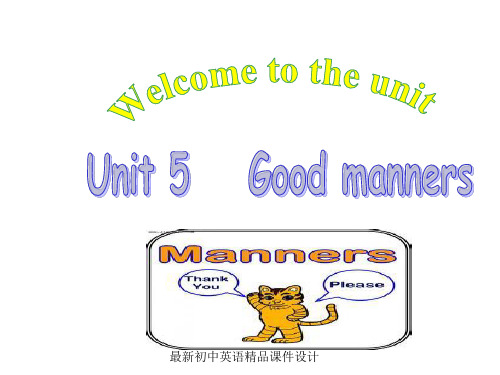
1. Don’t cut in on others. cut in (on sb/ sth) 打断(谈话),插嘴 Don’t cut in while I’m talking. You can say what you want later. 我说话的时候别插嘴,等会儿再说你想 说的话。
_W__e_t_a_k_e_t_u_rn__s _to__c_le_a_n__th_e_________ _b_l_a_ck_b_o_a_r_d_._______
最新初中英语精品课件设计
1. cut in on sb/sth 2. drop litter 3. keep quiet 4. pick flowers 5. keep the library clean 6. Don’t drop the litter everywhere. 7. We shouldn’t write in the books. 8. We should keep quiet.
housework. 我和姐姐轮流做家务。
最新初中英语精品课件设计
3. Always keep the library clean.
keep意为“使……处于某种状态”时, 其后可跟形容词、现在分词、过去分词 等作宾语补足语。 Close the door to keep the room warm. 关上门以保持室内温暖。 I’m sorry to keep you waiting so long. 对不起让你久等了。
d pick flowers in the park 2
e obey traffic rules
1
f queue for your turn
5
最新初中英语精品课件设计
牛津译林版英语八年级下册《Unit 5 Good manners Welcome to the un
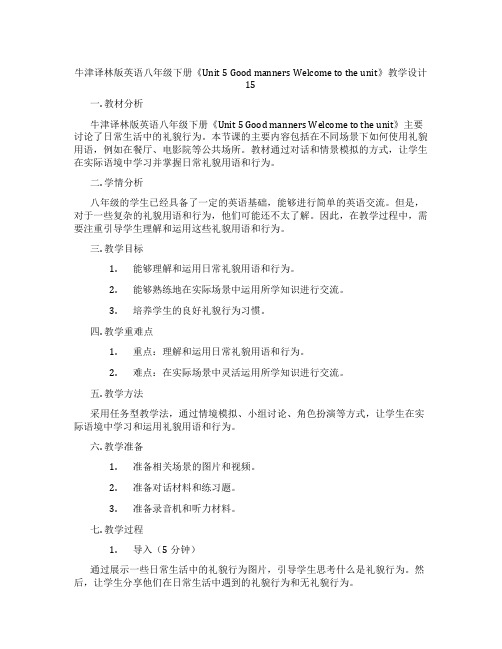
牛津译林版英语八年级下册《Unit 5 Good manners Welcome to the unit》教学设计15一. 教材分析牛津译林版英语八年级下册《Unit 5 Good manners Welcome to the unit》主要讨论了日常生活中的礼貌行为。
本节课的主要内容包括在不同场景下如何使用礼貌用语,例如在餐厅、电影院等公共场所。
教材通过对话和情景模拟的方式,让学生在实际语境中学习并掌握日常礼貌用语和行为。
二. 学情分析八年级的学生已经具备了一定的英语基础,能够进行简单的英语交流。
但是,对于一些复杂的礼貌用语和行为,他们可能还不太了解。
因此,在教学过程中,需要注重引导学生理解和运用这些礼貌用语和行为。
三. 教学目标1.能够理解和运用日常礼貌用语和行为。
2.能够熟练地在实际场景中运用所学知识进行交流。
3.培养学生的良好礼貌行为习惯。
四. 教学重难点1.重点:理解和运用日常礼貌用语和行为。
2.难点:在实际场景中灵活运用所学知识进行交流。
五. 教学方法采用任务型教学法,通过情境模拟、小组讨论、角色扮演等方式,让学生在实际语境中学习和运用礼貌用语和行为。
六. 教学准备1.准备相关场景的图片和视频。
2.准备对话材料和练习题。
3.准备录音机和听力材料。
七. 教学过程1.导入(5分钟)通过展示一些日常生活中的礼貌行为图片,引导学生思考什么是礼貌行为。
然后,让学生分享他们在日常生活中遇到的礼貌行为和无礼貌行为。
2.呈现(10分钟)通过播放一段录音,让学生听懂并理解对话内容。
然后,展示对话材料,让学生阅读并理解对话内容。
3.操练(15分钟)将学生分成小组,让他们根据对话内容,模拟实际场景,进行角色扮演。
鼓励学生大胆开口说英语,注意语音语调的准确性。
4.巩固(10分钟)通过一些练习题,让学生进一步巩固所学知识。
可以采用问答、填空、选择等形式。
5.拓展(10分钟)让学生讨论如何在日常生活中运用所学知识,遇到不礼貌的行为时如何处理。
牛津译林版英语八下Unit5《Goodmanners》(welcome)说课稿
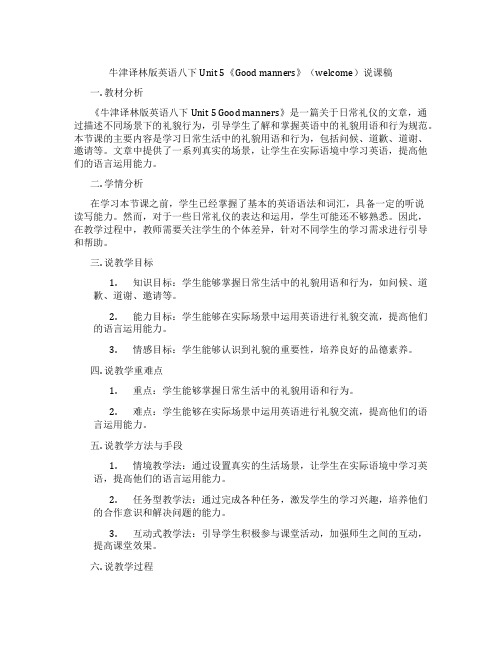
牛津译林版英语八下Unit 5《Good manners》(welcome)说课稿一. 教材分析《牛津译林版英语八下Unit 5 Good manners》是一篇关于日常礼仪的文章,通过描述不同场景下的礼貌行为,引导学生了解和掌握英语中的礼貌用语和行为规范。
本节课的主要内容是学习日常生活中的礼貌用语和行为,包括问候、道歉、道谢、邀请等。
文章中提供了一系列真实的场景,让学生在实际语境中学习英语,提高他们的语言运用能力。
二. 学情分析在学习本节课之前,学生已经掌握了基本的英语语法和词汇,具备一定的听说读写能力。
然而,对于一些日常礼仪的表达和运用,学生可能还不够熟悉。
因此,在教学过程中,教师需要关注学生的个体差异,针对不同学生的学习需求进行引导和帮助。
三. 说教学目标1.知识目标:学生能够掌握日常生活中的礼貌用语和行为,如问候、道歉、道谢、邀请等。
2.能力目标:学生能够在实际场景中运用英语进行礼貌交流,提高他们的语言运用能力。
3.情感目标:学生能够认识到礼貌的重要性,培养良好的品德素养。
四. 说教学重难点1.重点:学生能够掌握日常生活中的礼貌用语和行为。
2.难点:学生能够在实际场景中运用英语进行礼貌交流,提高他们的语言运用能力。
五. 说教学方法与手段1.情境教学法:通过设置真实的生活场景,让学生在实际语境中学习英语,提高他们的语言运用能力。
2.任务型教学法:通过完成各种任务,激发学生的学习兴趣,培养他们的合作意识和解决问题的能力。
3.互动式教学法:引导学生积极参与课堂活动,加强师生之间的互动,提高课堂效果。
六. 说教学过程1.导入:教师通过与学生互动,引导学生谈论日常生活中的礼貌行为,激发学生的学习兴趣。
2.新课展示:教师展示文章,引导学生阅读,理解文章内容。
3.课堂讲解:教师讲解文章中的重点词汇和语法,帮助学生理解和掌握。
4.实践环节:教师设置真实的生活场景,让学生分组进行角色扮演,实际运用英语进行礼貌交流。
牛津译林版8B Unit5 Good manners Welcome to the unit课件(共27张PPT)

What should they do in the lirary? They should keep quiet, keep the library clean and put the books back after reading . What shouldn't they do in the lirary? They shouldn't eat in the library. They shouldn't drop litter everywhere. They shouldn't eat there . They shouldn't write in the books.
Unit 5
Good manners
Welcome to the unit
complain (抱怨) Don't pick the flowery something about bad manners in public.
在公共场所
Please queue for your turn.
Make dialogues with your partne. You can choose the following places.
1. In the park , 2. At school (in class), 3. At school (after class), 4. In the resturant
Make a dialogue
In the cinema
chat in the cinema? A:Can we ______________( 聊天)? B:I'm afraid not .We should keep __________. quiet. A: Can we eat food in it ? drop litter everywhere. B: Yes, you can .But don't ______________ Please ___________. keep the cinema clean . A: OK. Anything else? B: Don't forget to ___________. take your litter away A: I see. Thank you .
最新牛津译林版中学八年级英语下册 Unit 5 Good manners welcome to the unit教案

Unit 5 Good manners welcome to the unit教学目标1.to learn some expressions on manners.2.to arouse the Ss’interest in learning this unit重点to learn some expressions on manners.难点to arouse the Ss’interest in learning this unit教学准备Multimedia;教学设计详案二次备课内容Step I导人1 Look a t the pictures.Are the people doing the right orwrong thi ngs?2 Do you want to be good citizens? How can you be goodcitizens? We must obey the rules and h av e good manners.教师呈现新单词obey和manner sStep II 呈现1 (1) What should the boy do when he cross the road?(He should obey the traffic rules.)(5)What is the man doing? (He is queuing for his turn.)(6)What did the boy do? (He left th e tap running. )2 Who’s doing right and who’s doin g wrong? Why?3 he Class 1,Grade 8 students are discussing the right andwrong things to do in public places.Look at the picturesin Part A and match them with the phrases.Comic stripStep I呈现1教师让学生思考还有哪些行为是值得提倡的,并引导学生用英语说出来。
牛津译林版8B Unit5 Good manners Comic strips & Welcome to the unit课件(共26张PPT)

Comic strips & Welcome to the unit
They are greeting their teachers.
They are standing in a line.
She is picking up the litter.
They are reading books quietly.
Task 6:Homework
1.Recite the dialogues.
2.Search more information about good manners in different countries.
Task 5:Homework.
1.Write a passage of at least 60 words on the topic “To be a student with good manners”. 2. Send your homework to me.My e-mail address is wyl678@
eat write in the books
Make a dialogue
1.Each group can choose one place.
A B C D E
2.Make a dialogue after the model. A:Can we ...in/on/at the...? B:I’m afraid not.We should.... A:Anything else? B:....
Comic strip
Comic strips
Task 1:Answer the question.
Who should learn about manners?
牛津译林版八年级下册Unit 5《Good manners》(Welcome to the Unit)课件
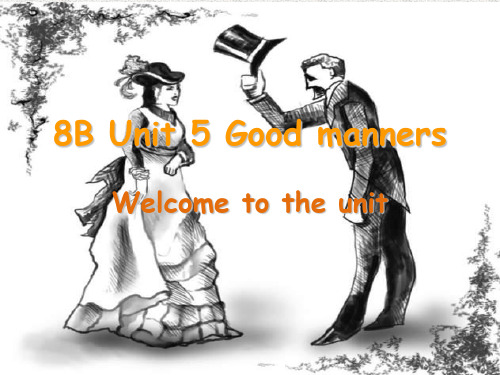
Bad We manners shouldn’t
write in the books _____
Manners in different places. A: Can we …? B: No , we can’t. We should….
A: Can we…? B: Yes, …
……
At the cinema
At the park
Write down more right things and wrong things in the video as possible as you can.
Watch the video and answer questions.
1. What does Eddie teach Hobo?
Please complete the form.
In the library
Good We should manners quiet keep ______ clean keep the library ______ put the books back _____ _____ after reading eat in the library chat or _____ drop _____ litter everywhere _____
litter [‘lɪtə] n.[U]垃圾,杂物
Doing the right things in the public places.
Can you cross the road like this way?
We should obey traffic rules. /ə’bei/ 遵守,顺从
Hobo is surprised, and he shouts, “Hey! That’s my _____ cake !” But Eddie asks Hobo to always _____ wait politely instead of cutting _____ in on others. Hobo is very angry _____ . He thinks Eddie should learn about manners too.
Unit5 词组讲义 2021-2022学年牛津译林版八年级英语下册

8B Unit5 Good manners词组讲义AWelcome to the unit1. 你已经到了学习礼仪的年龄了。
You are old enough to learn about manners.2. 你什么意思?What do you mean? = What’s your meaning?3. 别打断别人说话。
别插嘴。
Don’t cut in on others.打断(某人/某事),插嘴cut in(on sb/sth.)4. 活到老,学到老。
You are never too old to learn.5. 在公共场所应该做的正确的事the right things to do in public places6. 到处扔垃圾是不文明行为。
It’s bad manners to drop litter everywhere.7. 让水龙头开着/ 把它丢在家里了leave the tap running / leave it at home让灯开着/关着让窗开着/关着leave the light on/off leave the window open/closed8. 有礼貌地等待并保持安静wait politely and keep quiet9. 在花园摘花/另选一个城市参观/捡起它pick flowers in the park /pick another city to visit/ pick it up10. 遵守交规obey traffic rules = follow traffic rules11. 排队等候/排队做某事queue for y our turn / queue to do sth.12. 轮到某人做某事It’s one’s turn to do sth.轮到你交作业了。
It’s your turn to hand in your homework.13. 看完书后把它们放回去put the books back after readingReading14. 跟人打招呼的正确方式是什么?What’ s the proper way to greet people? (greet= say hello to)那是我能想到的帮助她的唯一方法。
牛津译林版8B Unit5 Good manners Welcome to the unit课件(34张ppt)

6. What did the boy do? He left the tap running.
Check the answers P65 A
1---e 3---c
5---f
2---d 4---a
6---b
in the library
P65 B Amy and her cousin Shirley are discussing what they should and should not do in the library. Work in pairs and discuss what we should and should not do in a public place.
6. What did the boy do?
1.What should the boy do when he crosses the road?
He should obey the traffic rules. 2. What is the girl doing?
She is picking flowers in the park.
Look at the pictures. Are they doing the right or wrong things?
Look at the pictures. Are they doing the right or wrong things?
New words
Do you want to be good citizens(公民)? How can you be good citizens? /ə`beɪ/ 遵守,顺从 We must obey the rules and have good manners. /`mænəz/ (复数),礼貌,礼 仪,规矩
牛津译林版8B Unit5 Good manners Welcome to the unit课件(共11张PPT)
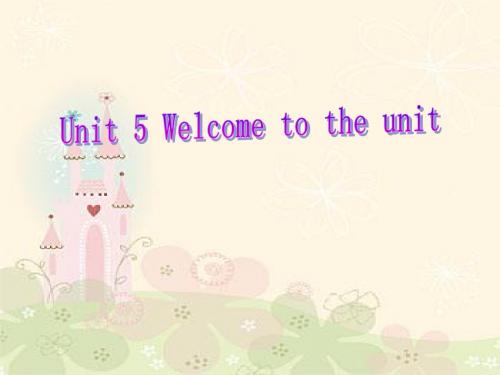
We should keep quiet keep the library clean put the books back after reading
We shouldn’t
chat drop litter everywhere eat write in the books
4) Sorry to leave my homework at home. 5) Mr Johnson left a note for you. 6)Don't leave it all until the last minute. 不要把什么事都留到最后一刻做。
7)When will he leave Germany for Paris? 5) Don’t leave the room until you clean it up.
We should obey We mustn't pick We should keep traffic rules. flowers in the park quiet in the librar It’s good manners to… It’s bad manners to…
We mustn't drop We should queue We mustn't leave litter everywhere. for our turn. the tap running.
1.我们的儿子已经够大,可以自己照顾自己了。 2. 他已经到了自己谋生的年龄了。 3. Eddie不够高去够到冰箱上的食物。 4. 我还不够自信在这么多人面前做演讲。 5. Tom不够强壮,来举起这个箱子。
1.Our son is old enough to look after himself. 2. He is old enough to make a living by himself. 3. Eddie is not tall enough to reach the food on the fridge. 4. I am not confident enough to give a talk in front of so many people. 5. Tom is not strong enough to lift the box.
牛津译林版英语八年级下册《Unit 5 Good manners Welcome to the un

牛津译林版英语八年级下册《Unit 5 Good manners Welcome to the unit》教学设计2一. 教材分析本课选自牛津译林版英语八年级下册Unit 5 Good manners Welcome to the unit 部分。
本节课主要讨论礼仪和行为规范,通过学习让学生掌握日常生活中的基本礼仪,培养他们的跨文化交际意识。
教材内容丰富,包括听力、阅读、口语和写作等多个方面,有利于全面提高学生的英语综合运用能力。
二. 学情分析八年级的学生已经具备一定的英语基础,对日常生活中的礼仪和行为规范有一定的了解。
但部分学生可能对一些细节性的礼仪知识掌握不够,需要通过本节课的学习进行巩固和提高。
此外,学生应该具备基本的听力、口语、阅读和写作能力,能够参与到课堂活动中。
三. 教学目标1.知识目标:–能够听懂、会说、会读、会写本节课的生词和重点句子。
–掌握日常生活中的基本礼仪和行为规范。
2.能力目标:–能够运用所学知识进行日常交流,提高跨文化交际意识。
–能够独立完成听力、阅读、口语和写作任务。
3.情感目标:–培养学生的合作意识,提高他们的自信心。
–使学生认识到礼仪和行为规范在生活中的重要性,培养良好的行为习惯。
四. 教学重难点•掌握本节课的生词和重点句子。
•了解日常生活中的基本礼仪和行为规范。
•运用所学知识进行实际交流,特别是在跨文化交际中。
•对于部分学生来说,听力理解和阅读理解可能存在困难。
五. 教学方法1.任务型教学法:通过完成各种任务,让学生在实践中掌握知识。
2.交际型教学法:通过角色扮演、小组讨论等形式,提高学生的交际能力。
3.情境教学法:创设各种生活情境,让学生在真实的环境中学习英语。
六. 教学准备1.教材、录音机、投影仪等教学设备。
2.与本节课相关的图片、视频等教学资源。
3.准备听力、阅读、口语和写作任务的相关材料。
七. 教学过程1.导入(5分钟)通过展示一些日常礼仪的图片,引导学生谈论礼仪和行为规范,激发学生的学习兴趣。
牛津译林版英语八年级下册《Unit 5 Good manners Welcome to the un
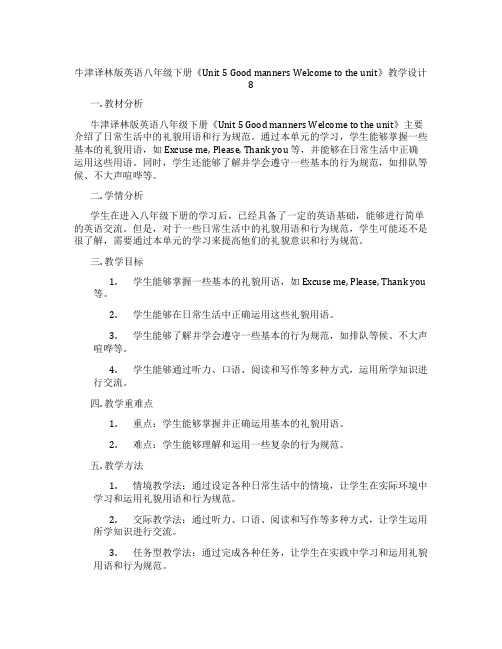
牛津译林版英语八年级下册《Unit 5 Good manners Welcome to the unit》教学设计8一. 教材分析牛津译林版英语八年级下册《Unit 5 Good manners Welcome to the unit》主要介绍了日常生活中的礼貌用语和行为规范。
通过本单元的学习,学生能够掌握一些基本的礼貌用语,如 Excuse me, Please, Thank you 等,并能够在日常生活中正确运用这些用语。
同时,学生还能够了解并学会遵守一些基本的行为规范,如排队等候、不大声喧哗等。
二. 学情分析学生在进入八年级下册的学习后,已经具备了一定的英语基础,能够进行简单的英语交流。
但是,对于一些日常生活中的礼貌用语和行为规范,学生可能还不是很了解,需要通过本单元的学习来提高他们的礼貌意识和行为规范。
三. 教学目标1.学生能够掌握一些基本的礼貌用语,如 Excuse me, Please, Thank you等。
2.学生能够在日常生活中正确运用这些礼貌用语。
3.学生能够了解并学会遵守一些基本的行为规范,如排队等候、不大声喧哗等。
4.学生能够通过听力、口语、阅读和写作等多种方式,运用所学知识进行交流。
四. 教学重难点1.重点:学生能够掌握并正确运用基本的礼貌用语。
2.难点:学生能够理解和运用一些复杂的行为规范。
五. 教学方法1.情境教学法:通过设定各种日常生活中的情境,让学生在实际环境中学习和运用礼貌用语和行为规范。
2.交际教学法:通过听力、口语、阅读和写作等多种方式,让学生运用所学知识进行交流。
3.任务型教学法:通过完成各种任务,让学生在实践中学习和运用礼貌用语和行为规范。
六. 教学准备1.教学PPT:制作教学PPT,包括本节课的主要内容、图片、情境等。
2.教学素材:准备一些与本节课相关的听力、口语、阅读和写作素材。
3.教学奖品:准备一些小奖品,用于激励学生。
七. 教学过程1.导入(5分钟)通过播放一段日常生活中礼貌用语和行为规范的短片,引起学生的兴趣,并导入本节课的主题。
牛津译林版英语八年级下册《Unit 5 Good manners Welcome to the un

牛津译林版英语八年级下册《Unit 5 Good manners Welcome to the unit》教学设计4一. 教材分析本课为牛津译林版英语八年级下册《Unit 5 Good manners Welcome to the unit》部分,主要介绍了日常生活中的礼仪和行为规范。
通过本课的学习,学生能够掌握有关礼仪的词汇和表达方式,提高自己的文明素养,培养良好的交际能力。
本课包括问候、道歉、道谢、邀请等礼仪场景,通过对话和活动,让学生在实际情境中学会运用英语进行礼貌交流。
二. 学情分析八年级的学生已经具备了一定的英语基础,能够听懂并运用简单的英语进行交流。
但部分学生对英语学习的兴趣不足,缺乏积极性。
此外,学生在日常生活中可能对礼仪知识了解不多,导致在实际交流中出现尴尬。
因此,在教学过程中,需要关注学生的兴趣激发和礼仪知识的实际应用。
三. 教学目标1.知识目标:学生能够掌握与礼仪相关的词汇和表达方式,如 greet,apologize, thank, invite 等。
2.能力目标:学生能够在实际情境中运用英语进行礼貌交流,提高自己的交际能力。
3.情感目标:学生能够认识到礼仪的重要性,培养良好的文明素养。
四. 教学重难点1.重点:礼仪相关词汇和表达方式的掌握。
2.难点:在实际情境中运用英语进行礼貌交流。
五. 教学方法1.情境教学法:通过设定真实的礼仪场景,让学生在实际情境中学习英语,提高交际能力。
2.任务型教学法:通过完成各种任务,激发学生的学习兴趣,培养合作意识。
3.互动式教学法:教师与学生、学生与学生之间的互动,提高课堂活力。
六. 教学准备1.教材:牛津译林版英语八年级下册。
2.课件:制作与本课内容相关的课件,包括图片、视频等。
3.道具:准备一些与礼仪相关的实物道具,如帽子、手套等。
七. 教学过程1.导入(5分钟)利用课件展示一些礼仪场景的图片,如问候、道歉等,引导学生思考礼仪的重要性。
牛津译林版英语八年级下册《Unit 5 Good manners Welcome to the un
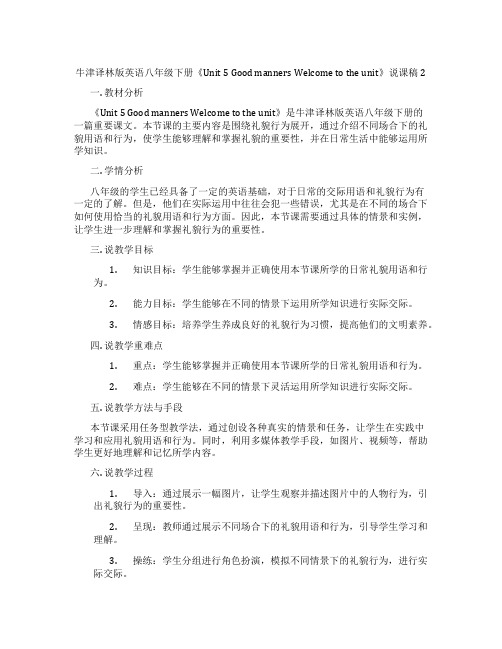
牛津译林版英语八年级下册《Unit 5 Good manners Welcome to the unit》说课稿2一. 教材分析《Unit 5 Good manners Welcome to the unit》是牛津译林版英语八年级下册的一篇重要课文。
本节课的主要内容是围绕礼貌行为展开,通过介绍不同场合下的礼貌用语和行为,使学生能够理解和掌握礼貌的重要性,并在日常生活中能够运用所学知识。
二. 学情分析八年级的学生已经具备了一定的英语基础,对于日常的交际用语和礼貌行为有一定的了解。
但是,他们在实际运用中往往会犯一些错误,尤其是在不同的场合下如何使用恰当的礼貌用语和行为方面。
因此,本节课需要通过具体的情景和实例,让学生进一步理解和掌握礼貌行为的重要性。
三. 说教学目标1.知识目标:学生能够掌握并正确使用本节课所学的日常礼貌用语和行为。
2.能力目标:学生能够在不同的情景下运用所学知识进行实际交际。
3.情感目标:培养学生养成良好的礼貌行为习惯,提高他们的文明素养。
四. 说教学重难点1.重点:学生能够掌握并正确使用本节课所学的日常礼貌用语和行为。
2.难点:学生能够在不同的情景下灵活运用所学知识进行实际交际。
五. 说教学方法与手段本节课采用任务型教学法,通过创设各种真实的情景和任务,让学生在实践中学习和应用礼貌用语和行为。
同时,利用多媒体教学手段,如图片、视频等,帮助学生更好地理解和记忆所学内容。
六. 说教学过程1.导入:通过展示一幅图片,让学生观察并描述图片中的人物行为,引出礼貌行为的重要性。
2.呈现:教师通过展示不同场合下的礼貌用语和行为,引导学生学习和理解。
3.操练:学生分组进行角色扮演,模拟不同情景下的礼貌行为,进行实际交际。
4.巩固:教师提供一些实际情景,让学生进行小组讨论,并选择正确的礼貌用语和行为。
5.拓展:学生分组进行编写对话,讨论如何在日常生活中运用礼貌行为,并进行展示。
6.总结:教师对本节课所学内容进行总结,强调礼貌行为的重要性。
最新牛津译林版八年级英语下册 Unit 5 Good manners Welcome to the Unit精品课件 (1)
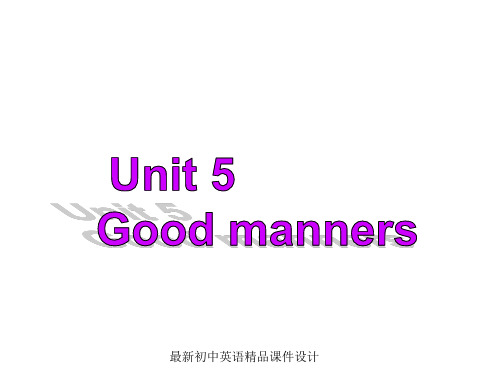
顺序
最新初中英语精品课件设计
Discussion
We should have good manners in public. Look at the following pictures and answer whether they are they doing right or wrong?
Hobo is very _a_n_g_r_y. He thinks Eddie should learn about manners too.
最新初中英语精品课件设计
Phrases and useful expressions
最新初中英语精品课件设计
good manners
有礼貌,良好的习惯
cut in (on sb)
the library clean. Shirley: I see. Can we eat in the library? Amy: No, we can’t eat there. Shirley: Can we write in the books? Amy: No, we shouldn’t write in the books,
and we should put them back after reading.
最新初中英语精品课件设计
Work in pairs and discuss what we should and should not do in a public place. Use this conversation as a model.
最新初中英语精品课件设计
最新初中英语精品课件设计
最新初中英语精品课件设计
最新初中英语精品课件设计
新译林版8B Unit5 Good manners Welcome to the unit课件
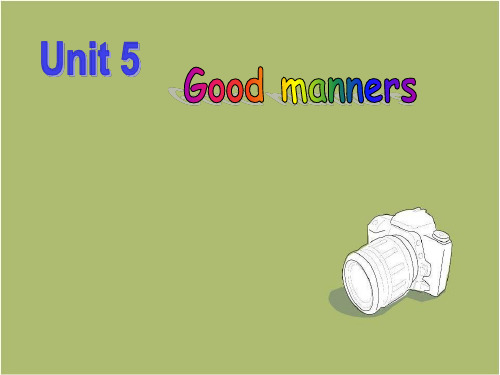
If we walk on the road,
we should obey traffic rules. we should look at the traffic lights. we should help the old cross the road. we shouldn’t play on the road. we shouldn’t walk side by side(并排走). …
Second, don’t cut in on others. Always wait politely.
Try to use body languages (体态语)and gestures(手势).
Use your own words if you want. Pay attention to your pronunciation and intonation.
When we pay a visit to a zoo, we should be kind to animals. we should follow the guide in the zoo if necessary. we shouldn’t spit(吐痰) in the zoo. we shouldn’t feed animals. we shouldn’t play tricks on animals. we shouldn’t frighten animals. …
When we have lessons in the classroom,
we should work in pairs if necessary. we should listen to the teachers carefully. we should take part in class-activities. we should help group members if possible. we shouldn’t answer questions without putting up our hands. …
牛津译林版八年级英语下册Unit 5 Good manners (Welcome)精品课件(22张)
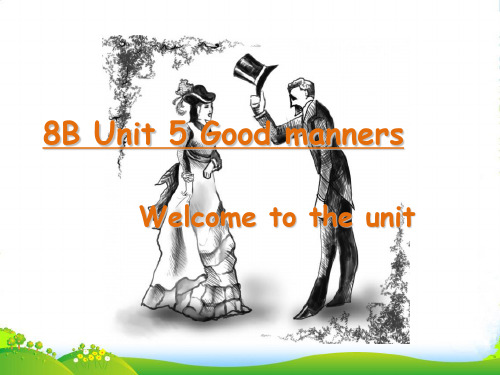
Welcome to the unit
A game
If it is right, stand up. If it is wrong,
Is it right or wrong to do so?
right
wrong
Try to use the following expressions: had better (not)…… must / mustn’t should / shouldn’t can / can’t …… Please always …… Don’t …… Never ……
Let’s remember……
Discuss in a low voice.
(good manners)
You can do better than the film stars.
drop litter
spit (吐痰)
jump the queue
step(踩) on the
seat with shoes on
Public places
We must protect the environment.
Good manners or bad manners?
√
You’d better queue for your turn . You should never jump the queue.
Good manners or bad manners?
×
Don’t leave the tap running. We should save water all the time.
Think and write
What other good manners can you share with us?
- 1、下载文档前请自行甄别文档内容的完整性,平台不提供额外的编辑、内容补充、找答案等附加服务。
- 2、"仅部分预览"的文档,不可在线预览部分如存在完整性等问题,可反馈申请退款(可完整预览的文档不适用该条件!)。
- 3、如文档侵犯您的权益,请联系客服反馈,我们会尽快为您处理(人工客服工作时间:9:00-18:30)。
When we have lessons in the classroom,
we should work in pairs if necessary. we should listen to the teachers carefully. we should take part in class-activities. we should help group members if possible. we shouldn’t answer questions without putting up our hands. …
If we walk on the road,
we should obey traffic rules. we should look at the traffic lights. we should help the old cross the road. we shouldn’t play on the road. we shouldn’t walk side by side(并排走). …
1
2 Don’t pick flowers pick flowers in the park in the park. 4
obey traffic rules 3
keep quiet in the library throw drop rubbish litter everywhere in the bin
You offer your chair to someone older than you.
If we play games on the playground, we should queue … for our turn. shouldn’t … partners(尊重伙伴). we should respect we should have team spirit(团队精神). we shouldn’t shout loudly. we shouldn’t jump the queue. we shouldn’t fight with others. …
If we walk on the road,
we should obey traffic rules. we should look at the traffic lights. we should help the old cross the road. we shouldn’t play on the road. we shouldn’t walk side by side(并排走). …
5
6
queue for your turn
leave turn the off tap the running tap
You shout out the answer without putting your hand up.
You share with others.
You help with some housework at home.
When we are at home, we should respect our parents. we should greet our parents every day. we should make the bed by ourselves. we should be helpful to others in our family. we shouldn’t shout at our parents. we shouldn't fight with our sisters or brothers. …
When we pay a visit to a zoo, we should be kind to animals. we should follow the guide in the zoo if necessary. we shouldn’t spit(吐痰) in the zoo. we shouldn’t feed animals. we shouldn’t play tricks on animals. we shouldn’t frighten animals. …
good manners
Turn off the tap. tap n. Don’t leave the tap running.
Don’t drop litter litter. n. Obey obey traffic vt.&vi. rules.
Wait in line. Queue for your turn.
When we have lessons in the classroom,
we should work in pairs if necessary. we should listen to the teachers carefully. we should take part in class-activities. we should help group members if possible. we shouldn’t answer questions without putting up our hands. …
When we are at home, we should respect our parents. we should greet our parents every day. we should make the bed by outo others in our family. we shouldn’t shout at our parents. we shouldn't fight with our sisters or brothers. …
When we pay a visit to a zoo, we should be kind to animals. we should follow the guide in the zoo if necessary. we shouldn’t spit(吐痰) in the zoo. we shouldn’t feed animals. we shouldn’t play tricks on animals. we shouldn’t frighten animals. …
